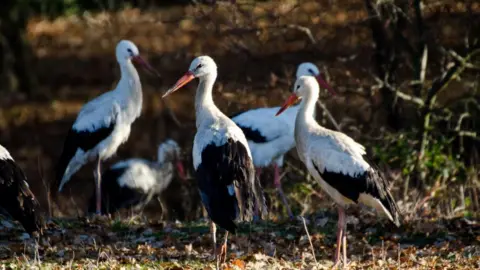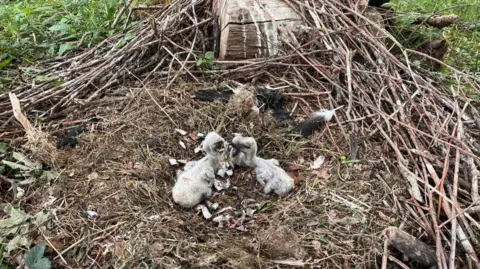Storks migrate home in reintroduction project
 PA Media
PA MediaStorks born in England have successfully returned home after migrating to Morocco.
The White Stork Project, launched in 2016, releases young storks at the Knepp estate in West Sussex and Wadhurst Park in East Sussex to encourage the birds to later return there to nest.
At least six birds born at Knepp in 2024 returned to nest in the colony, including one who has set up home in the same tree as her parents, according to project officer Laura Vaughan-Hirsch.
Knepp estate owner Isabella Tree said the estate's storks were "interacting with wild birds and bringing wild birds back with them as pairs".
Storks stopped breeding in Britain centuries ago due to hunting and habitat loss.
Birds now living at Knepp had given birth to more than a dozen fledglings by May and about 40 more were expected in 2025.
 PA Media
PA MediaThe project began reintroducing storks to southern England in 2016 by taking on rescued, non-flying birds from Warsaw Zoo, in Poland, breeding them at Cotswold Wildlife Park, then releasing their young in Sussex.
Other Polish storks, some of which have injuries that mean they can fly short distances but not migrate, live in or around a fox-proof enclosure at Knepp, breeding and establishing the founding colonies that will attract other storks.
Baby ground-nesting storks are hand-fed pieces of fish to supplement food their parents can source in the pen.
The storks' success at Knepp showed that "sort the habitat out, the soils, insects, healthy water systems, and then your storks will come eventually," Ms Vaughan-Hirsch said.
"We all see the white stork as a big charismatic species but what it really is, is an emblem for nature recovery."
The landscape at Knepp has undergone rewilding since 2000, converting agricultural land into scrub, disturbed ground and grassland.
There are also areas of woodland, the nearby river has been restored to a more natural state, and reintroduced beavers in an enclosure have turned a small stream into insect-filled wetlands.
Ms Tree added: "What are we are seeing is that even species that don't have a reputation as being keystone species have an effect on ecosystems.
"They are doing extraordinary things that we had never really known about."
Additional reporting by PA Media.
Follow BBC Sussex on Facebook, on X, and on Instagram. Send your story ideas to [email protected] or WhatsApp us on 08081 002250.
